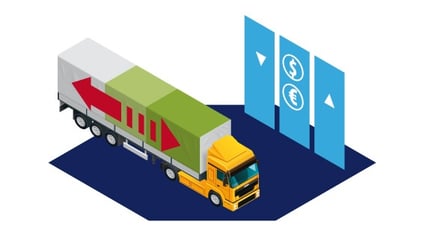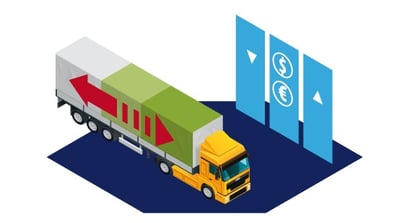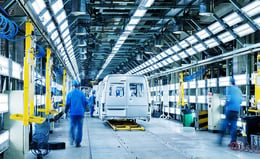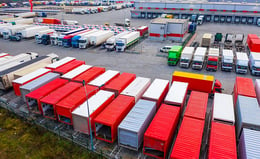Uncovering the True Value of Transport Logistics
Brian Hoey - April 19, 2018

 Imagine for a moment that you’re planning a camping trip with your friends. There are several of you, and the trip will last a few days, meaning that you’re going to have to take two cars and considerable volume of supplies. How do you decide how each car will be filled? Let’s say your friend already has tent poles and fire starting material, so it might fall to you to procure and transport sleeping bags and food supplies. If one car is more fuel efficient than the other, does that change your plans? How will you go about choosing the right route to your destination in order to find the right balance between toll roads and potentially less direct pathways?
Imagine for a moment that you’re planning a camping trip with your friends. There are several of you, and the trip will last a few days, meaning that you’re going to have to take two cars and considerable volume of supplies. How do you decide how each car will be filled? Let’s say your friend already has tent poles and fire starting material, so it might fall to you to procure and transport sleeping bags and food supplies. If one car is more fuel efficient than the other, does that change your plans? How will you go about choosing the right route to your destination in order to find the right balance between toll roads and potentially less direct pathways?
In a perfect scenario, everyone arrives at the designated campsite at the agreed upon time in the most cost-effective way—but as any transport planner can tell you, devising that perfect scenario is no easy task. Not only is it difficult to optimize the transportation of various items, but disruptions like fuel price increases, road closures, and inclement weather are often virtual certainties. In the context of a camping trip, the stakes are relatively low, but in the worlds of manufacturing and freight forwarding, these same considerations present a level of complexity that many businesses can have a difficult time coping with.
The ability to cope with this complexity is, in a nutshell, the true value of transport logistics. But let’s dig a little deeper into exactly what that means.
Industry 4.0 Integration
At a very basic level, effective transport management means ensuring that the right product goes to the right place at the right time. But when you look at the broader picture, it’s easy to see that transport logistics is much more than that: it’s a supply chain process that rewards transparency, interconnectivity, and end-to-end (E2E) visibility with added value and increased adaptability. Transport planning solutions thrive in Industry 4.0 environments. By creating an interoperable architecture that connects disparate points across a given company’s value chain, Industry 4.0 promotes the kind of transparency that enables transport solutions to predict and react to potential bottlenecks or other supply chain events. By breaking down information siloes, Industry 4.0 workflows create an environment in which transportation planners can:
- Respond to disruptions with little or no lead time
- Optimize routing and vehicle capacity based on appropriate risks and restrictions
- Avoid relying on outdated or incomplete information when making transport decisions.
In this way, smart transportation planning goes hand in hand with the emerging technologies that are rapidly shaping a number of business sectors. Together, these innovations can help alleviate the rigid, siloized, and past-oriented supply chain processes that have historically plagued manufacturing operations.
Enhanced Agility
In an Industry 4.0 environment, transport logistics contributes to an overall value proposition rooted in larger, interconnected systems. Outside of that context, much of the value of smarter transportation planning comes in the form of increased agility across all transport operations, from route optimization and full-truckloads to hub utilization and capacity usage. With an overall decrease in informational siloes and the integration of real-time supply chain information into planning processes, it’s possible to gain the visibility necessary to respond to disruptions in an agile and efficient manner, thereby minimizing losses and limiting any additional bottlenecks.
In our camping trip example, transport logistics would aid you and your friends in the event that a member of the group had to cancel and you had to decide whether to consolidate the relevant equipment into one car or wait to potentially find another passenger who could help defray the costs of the trip. Likewise, as traffic patterns changed, it would enable you to adjust course in real time in order to ensure an on-time arrival. For manufacturers, this can mean the optimization of fleet and capacity usage even when reality deviates from expectations.
Customer Satisfaction
While sophisticated technological solutions are increasingly necessary in a rapidly changing global marketplace, the most meaningful measure of value comes not from added convenience but from the impact a given technology has on the customer. Luckily, the realm of customer experience is where transport logistics can have the biggest impact. With increased flexibility and smarter integration with other mission critical technologies, it’s possible for smart transportation management to increase your proportion of on-time deliveries, even in situations with short or just-in-time delivery windows, providing value for your customers and in turn earning their gratitude. Not only that, but smarter transport technology can drive customer-facing benefits like real-time order tracking that can help to strengthen trust and build lasting business relationships.
LATEST POSTS
- Understand Why Production Planning Needs Specialized Solutions
- Understand Circular Economy in The Manufacturing Industry
- How Can Industry 4.0 IT Integration Be Achieved Smoothly?
- The Significance of Order Sequencing in Discrete Manufacturing
- How to improve your Supply Chain Management: The Power of Control Towers



